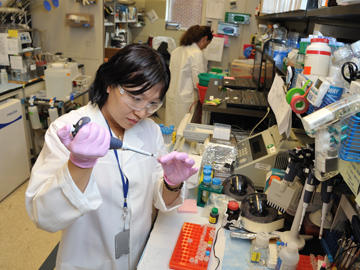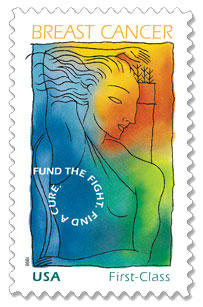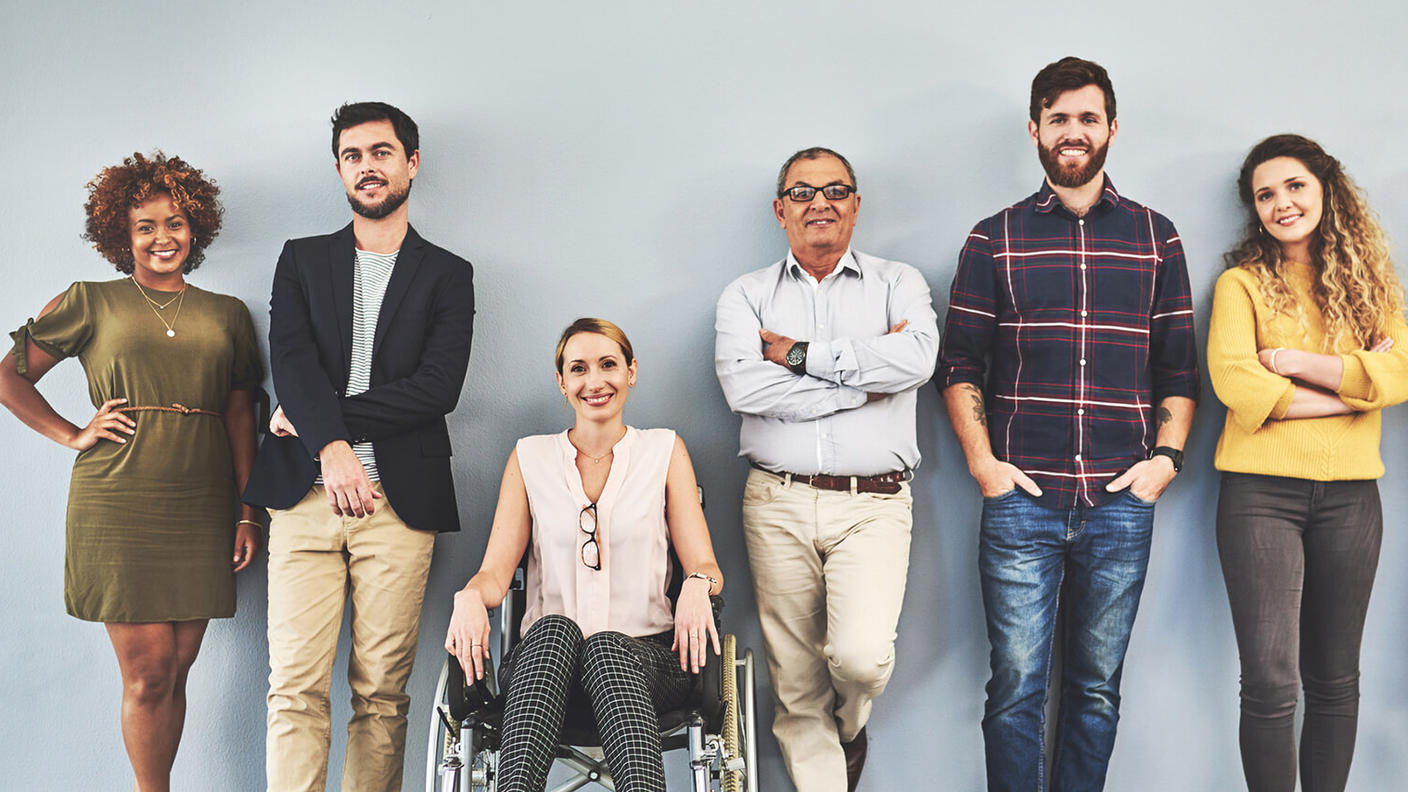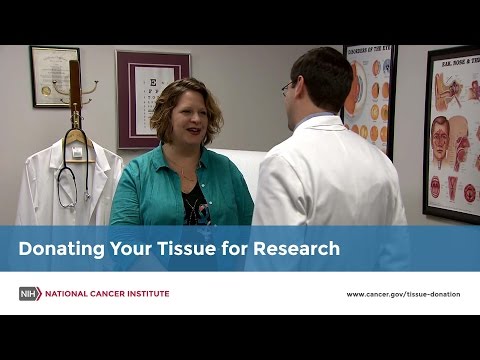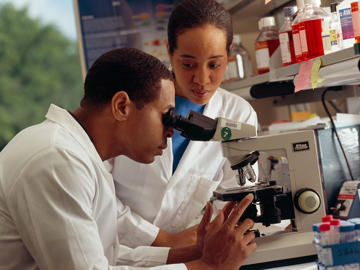The NCI Gift Fund
The NCI Office of Budget and Finance (OBF) manages the cancer donations that NCI receives from the public, including funds received through the Breast Cancer Research Stamp. Other cancer donations from the public are deposited into the NCI Gift Fund as well. These donations are authorized by laws enacted by the US Congress.
Cancer donations into the NCI Gift Fund are separate from the funding that NCI receives from Congress. NCI’s annual funding from Congress supports NCI operations and administrative costs. NCI applies the Gift Fund donations to other special purposes that support the work of the NCI.
As a federal agency of the United States, gifts made directly to the NCI are generally tax deductible as charitable contributions under section 170(c) of the Internal Revenue Code of 1986, as amended. You may read more details on the IRS website, and contact your tax advisor.
Projects supported by the Gift Fund
Projects supported through the Gift Fund may vary from year to year depending on NCI research priorities. Some of the activities that have received NCI Gift Fund assistance include:
- supporting special fellowships to train young scientists in cancer research
- acquiring lab equipment to support cancer research
- assisting patients with financial needs through the NIH Clinical Center's Patient Emergency Fund
- supporting workshops and conferences on subjects of special importance to cancer research
- supporting Camp Fantastic, a week-long adventure for children ages 7–17 who are undergoing cancer treatment
How to donate to the Gift Fund
We accept donations by letter. There are many reasons to donate to cancer research, whether you have had cancer yourself, or you want to support a friend or loved one. If you choose to, they can be in memory or in honor of those in your life who have been touched by cancer. Your donation can also support a specific type of research.
Please be sure to include in your letter:
Name (contact person)
Company Name (if applicable)
Street Address
City, State and Zip Code
Phone Number (optional)
You can let the NCI decide how best to use your cancer donation. But if you would like to choose the focus, you can do so through:
- Memorial donations: Please include the name of your loved one in your letter, as well as the name(s) and address(es) of the person(s) whom you would like NCI to acknowledge for the memorial donation (a spouse, sibling, parent, etc.).
- Honorary donations: Please write the name of the person your donation is in honor of in your letter, as well as the name(s) and address(es) of the person(s) whom you would like NCI to acknowledge for the honorary donation (the honoree, a spouse, a sibling, a parent, etc.).
- Research designation: All donations are applied to projects that support NCI’s mission of cancer research, as determined by the NCI director. However, you may state in your letter if you would like your donation to support a specific type of cancer research.
How to donate
If you wish to donate, you may send a check or money order payable to "The National Cancer Institute" and a letter indicating that the donation is to be used for NCI research to this address:
Director
National Cancer Institute
Building 31 Room 11A-16
9000 Rockville Pike
Bethesda, MD 20892
Questions
We are happy to answer any questions you may have about donating to the NCI Gift Fund. Please feel free to contact us at 1-800-4-CANCER.
The Breast Cancer Research Stamp
Congress enacted the Stamp Out Breast Cancer Act of 1997, which required the United States Postal Service (USPS) to issue a special stamp related to breast cancer, priced at a higher rate than the standard first-class postage for mailing a letter. Seventy percent of the net proceeds from the Breast Cancer Research Stamp surcharge go to the National Institutes of Health for breast cancer research and 30% to the Department of Defense for the same purpose.
You can contribute to cancer research by purchasing the Breast Cancer Research Stamp at USPS.com or your local post office.
Quick facts
- The Breast Cancer Research Stamp is the country’s first fundraising stamp and was first issued on July 29, 1998.
- Ethel Kessler of Bethesda, Maryland designed the stamp; it features the phrases, "Fund the Fight" and "Find a Cure" and an illustration of a mythical "goddess of the hunt" by Whitney Sherman of Baltimore, Maryland.
- United States Senators Dianne Feinstein (D-CA), Alfonse D’Amato (R-NY), and Lauch Faircloth (R-NC), and United States Representatives Susan Molinari (R-NY), Vic Fazio (D-CA), and Charles W. Norwood (R-GA) were the original sponsors of the legislation.
- The stamp was the idea of three passionate people who lobbied for Congress' approval of the stamp and who eventually partnered with Senator Feinstein and her colleagues to advance the creation and issuance the stamp:
- Ernie Bodai, M.D., a Kaiser Permanente breast surgeon who performs lumpectomies and mastectomies on women with breast cancer and the founder of the nonprofit organization Cure Breast Cancer, Inc.
- Betsy Mullen, a breast cancer survivor and advocate as well as the founder of WIN Against Breast Cancer and the Breast Buddy Breast Care Program
- David Goodman, who lost his first wife to breast cancer
Reports to Congress: how breast cancer research stamp funds are used
A provision of the Stamp Out Breast Cancer Act, reauthorized until 2027 (P.L. 116-92), requires NIH to submit an annual report on the use of funds received from stamp sales to Congress and the Government Accountability Office. The NCI prepares these reports on behalf of NIH. For an example, see the Breast Cancer Research Stamp Fiscal Year 2020 Report.
Other ways to give back to cancer
There are other ways besides money to be involved in the fight against cancer. People often feel that they can make a difference in cancer by taking action in other ways. There are many options to choose from. Giving support and volunteering, helping with outreach and education, and increasing awareness about issues are just some of the many things you can do. Many people find a sense of fulfillment when they help others. Below are some ways you can make a difference in cancer.
Get involved in cancer-related activities
There are a number of ways you can get involved with efforts aimed at the fight against cancer, or those that help others cope with the disease. You can:
- Volunteer with cancer patients and their caregivers. You can give support in everyday ways, such as helping people with cancer with meals and errands, or driving them to appointments. Or you can become part of a peer support program to help others with cancer.
- Raise awareness about cancer. Learn more about cancer and help others by raising awareness and sharing what you know about the disease. Or help people in their search for information as they look at the many websites and organizations that pertain to cancer. If you’re a cancer survivor or loved one of a patient, you may be able to help people understand the health care system.
- Give support to cancer advocacy groups. Cancer-related organizations include many different kinds of groups that help people with cancer. These groups may focus on areas such as service and support, fundraising, research, or policy matters. Many need the help of volunteers.
See the NCI booklet Facing Forward: Making a Difference in Cancer for more information on getting involved in cancer-related activities.
Take part in cancer research studies
You don’t have to have cancer to take part in a research study. There are different ways to get involved in this way. Some kinds of studies you might be able to try are:
- cancer prevention trials, which try to find better ways to prevent people from getting cancer or lower the chances that they will get it
- studies of families with an inherited condition that may increase cancer risk
- cohort studies, which follow a group of people over time to study their cancer outcomes
- cancer screening studies that look at different methods of detecting cancer
See Participate in Cancer Research for more information. To learn more about prevention trials, see Participate in Cancer Prevention Studies.
Donate tissue
Conducting research with tissue is essential for finding ways to prevent, diagnose, and treat cancer. People with cancer may be asked to give some of their tissue for medical research. (Sometimes tissues are needed from people without cancer, too.) Tissue can include materials from your body such as skin, hair, nails, blood, and urine. By giving your tissue, you could help scientists gain knowledge that might save lives.
The tissue you give to research is usually leftover tissue from a medical test. For example, if you have a blood test, you may choose to let the leftover blood be stored and used for future research. Your decision on whether or not to give tissue will not affect your care. Your tissue can’t be used without your consent.
You won’t get to choose what kind of research your tissue is used in, just as you can’t choose who gets your blood when you donate at a blood drive. However, you will have the reward of knowing you helped researchers find new ways to prevent and treat cancer.
For more information, see Donating Medical Data and Samples Helps People and Science.
Be an NCI research advocate
NCI encourages cancer patients, survivors, and family members to consider taking part in planning and communicating about cancer research. Research advocates bring the patient perspective to NCI and serve as a reminder of the need for research focused on patient benefits and outcomes. Advocates also support the sharing and communication of scientific advances that lead to new and better methods to prevent, detect, and treat cancer.
Examples of what an advocate role may be include:
- taking part on a formal advisory board
- working on NCI initiatives
- sharing research findings with nonscientific audiences
Making decisions about private organizations and cancer research fundraising
There are many private organizations in the United States that raise money for cancer research and treatment and provide other support activities. Some of these private organizations may refer to NCI and include the toll-free telephone number for NCI’s Cancer Information Service in their fundraising literature. However, NCI is not affiliated with any of these organizations and does not participate in or endorse their fundraising activities.
Questions that may help you evaluate the operations of a fundraising organization and make an informed decision about contributing to the organization include:
- Does the organization make its budget and a complete annual report, including an audit by an independent certified public accountant, public?
- Are the group’s fundraising and administrative costs reasonable?
- Does the organization use ethical and economical fundraising methods?
- Is the organization transparent about how it is managed?
- Is the information it distributes misleading, deceptive, or inaccurate?
Resources
- BBB Wise Giving Alliance: BBB Wise Giving Alliance is an affiliate of the Council of Better Business Bureaus and they use specific standards for charitable accountability to evaluate the fundraising activities of private, nonprofit organizations. These standards address the practices of public disclosure, financial accountability, fundraising activities and materials, and the governing body of the organization.
- The Office of the Attorney General: Most state offices have a consumer protection division that investigates complaints from the public lodged against companies and other organizations. Contact information is located in the blue government pages of your local telephone directory or on state government websites.
- Gift Agreements Help: This helpful guide identifies some of the more common issues that emerge in gift agreements and related gift documents that the NCI receives from donors. This is a useful tool to help draft gift agreements in according with NIH Policy Manual Chapter 1135.
- State or Local Consumer Protection Offices: Your local consumer protection agency page on USA.gov includes contact information for local consumer protection offices that respond to consumer complaints. A complete list of state, county, and city government consumer protection offices is also available.
- The Federal Trade Commission (FTC): FTC’s Charity Scams page includes tips on how to make your donations count by learning about charities and the warning signs of a scam. FTC also offers a publication called Before Giving to a Charity, which has information about making donations to organizations and whom to contact if you have questions or complaints. Although FTC does not investigate individual consumer complaints, complaints reported to the agency can help it detect patterns of wrongdoing and lead to investigations and prosecutions. Complaints can be filed on the FTC Complaint Assistant page.
